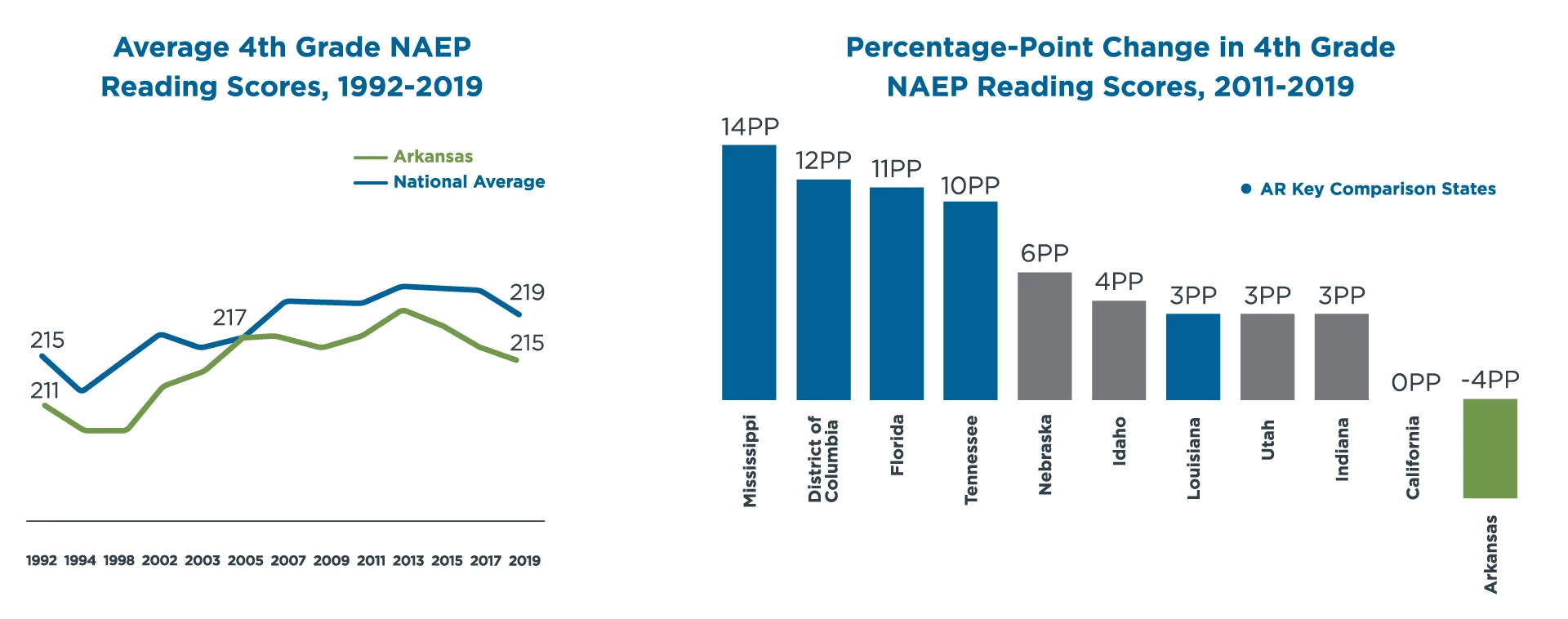Recommendation
Maintain the state’s focus on the science of reading and enhance strategies to support school-level buy-in at a greater scale and effective implementation at an accelerated pace. Explore, assess, and consider additional policies utilized by neighboring states to accelerate reading proficiency.
Context and Arkansas Progress
Student proficiency in reading, particularly by third grade, is predictive of later life outcomes, including attendance, self-esteem, student achievement, and high school graduation. According to the National Assessment of Educational Progress (NAEP), the share of Arkansas 4th graders proficient in literacy has declined, while neighboring states like Mississippi and Tennessee have made substantial gains. These states provide fruitful examples for a potential path forward in Arkansas.

There are four common strategic initiatives across neighboring states that have made literacy proficiency improvements on NAEP, and Arkansas has begun initial efforts in all – early literacy, quality curriculum, leadership, and teacher professional development.
- Early Literacy - Arkansas has started to make improvements through the science of reading and associated Reading Initiative for Student Excellence (R.I.S.E.) which starts in pre-K.
- Quality Curriculum - Through EdReports, Arkansas provides K-12 teachers, schools and districts guidance on selecting High-Quality Instructional Materials (HQIM) at the local level.
- Leadership - Through Arkansas Thrive, leaders received training on how to integrate their various academic, behavioral, and mental initiatives into one cohesive strategy.
- Teacher Professional Development - Teacher learning and collaboration around the science of reading and student data has been enhanced by the Professional Learning Communities (PLCs) and other initiatives such as high-quality professional learning year-round.
Opportunities for Arkansas
Arkansas’s neighboring states highlight key opportunities to further the state’s focus on the science of reading and improvements, which include:
- Clear, broad communication to reiterate the state’s commitment to, and the longevity of, the science of reading and its potential impact of implementation on student outcomes.
- Explore additional policies such as proficiency-based promotion, as seen in Mississippi, Tennessee, and Florida, which requires third graders to demonstrate reading proficiency before advancing to the fourth grade.
- Enhance approaches to build buy-in and support implementation at greater scale which may include:
- Providing design support and technical assistance for districts and schools to modify structures like school schedules and staffing models to support the integration of the science of reading
- Devote resources to and integrate effective, targeted interventions for struggling readers as part of a cohesive strategy
- Increasing the quality and consistency of mentorship and coaching around implementation of the science of reading for both teachers and school leaders
- Investment in rigorous curricula aligned to the science of reading that build upon current initiatives, like the Arkansas Initiative for Instructional Materials (AIIM), and increase adoption of high-quality materials through ranking systems and subsidies for preferred materials
